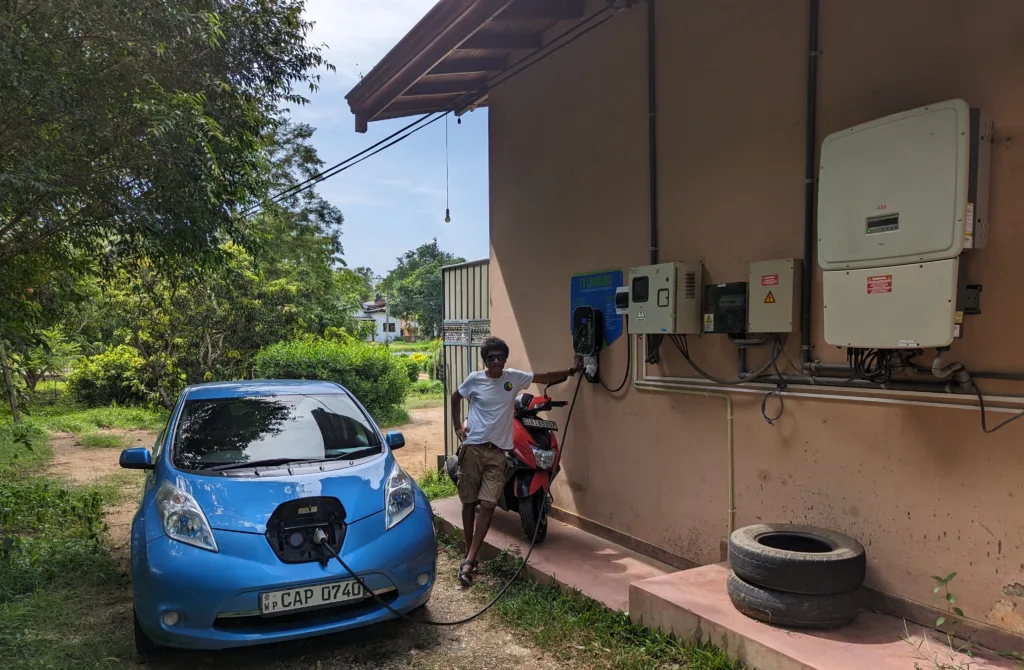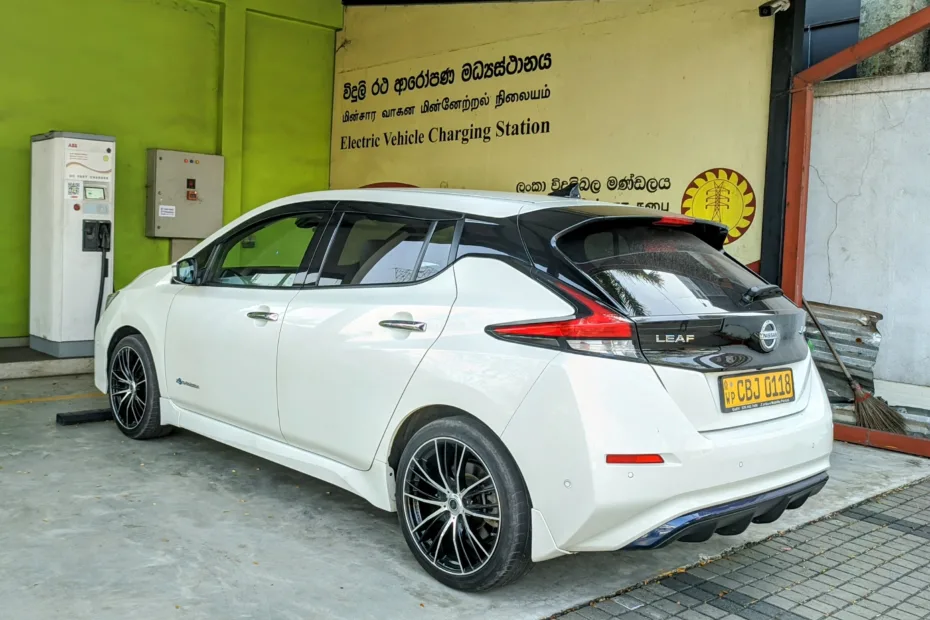If you are going to drive an electric vehicle, you will be needing to learn the language of electricity.
Some think that’s asking too much—that even though you understand units like inches and feet, meters and kilometers, cups and gallons, milliliters and liters, kilobytes and megabytes and gigabytes, you’ll never learn the basic units of electricity. And even though you already have appliances in your house, like hair dryers and microwave ovens, that have the wattage printed right on the front, there are some people who think electricity is just too complicated.
So when it comes to EVs, manufacturers, and charging station operators try to dumb it down for you. Instead of telling you the actual power rating of a charging station, they’ll tell you how many kilometers of range you can get per minute or hour of charging. Instead of telling you the size of your car’s battery pack, they’ll tell you how far it goes on a charge.
Also, the charging time may vary vastly based on the energy flow rate from the charger to EV. That could be due to charger, Grid, or EV battery issues.
EVs don’t all go the same distance on a given amount of electricity, and the distance you can go will also depend on the weather, your driving habits, how much you’re using the air conditioning or heater, and other factors. While one EV might go 6 kilometers on a kilowatt-hour, another might go 9 km/kWh. So even though you may learn exactly how far your EV can go on a kilowatt-hour of electricity, that number could be totally different for your neighbor’s EV. This means that there is no correct and consistent way to say how many miles of range a given charger can deliver per hour of charging time.
Learning the Units
A good way to understand electricity is through water metaphors. A kilowatt, denoted kW, is a rate of energy flow. It’s like the gallons per minute that a water hose or pump can deliver.
A kilowatt-hour, denoted kWh, is a quantity of electricity, like a liter. A bigger battery pack with a higher number of kWh will hold more electricity, just as a bigger bucket will hold more liters of water.
Now let’s put them together.
If you run a 1-kilowatt generator (or EV charging station) for 1 hour, it will deliver 1 kilowatt-hour of electricity. (1 kilowatt multiplied by 1 hour equals 1 kilowatt-hour.)
And that’s it! You’re done! You have learned the electricity units.
Let’s test your knowledge now.
If you plug in your EV to a 50 kW charging station, and it runs at full power (see text box on Charging Station Power Rating) for one hour, how much energy would it pump into your car’s battery? That’s right: 50 kWh, because 50 kW multiplied by 1 hour equals 50 kWh.
Charging Station Power Rating
The rate of power that EVs actually get while charging changes depending on how full the battery is. Starting from a low state of charge, a battery will charge at the maximum rate that the vehicle’s charge controller will allow, and then as the battery fills up, it will slow down the rate of charging, until it’s down to a trickle when the battery is almost full. So it’s unlikely that you would get a full 50 kW of power continuously for an hour as in this example. But that’s a technical nuance that you’ll understand as you become accustomed to charging your vehicle.
EV Charging Equipments
Now let’s talk about the different levels of charging equipment.
If you just plug a Nissan Leaf straight into a standard wall outlet with your EVSE (Level 2, (US Level 1)), without using a charging station, you’ll get about a 3.6 kW rate of charge. That is based on the capacity of your EVSE and the onboard charger (OBC).
If you get a home charging station (Level 2) to charge up your car faster, it will probably have a power rating somewhere between 6 kW and 19 kW. That is based on your EV onboard charger capacity as well.

If you use an older public fast-charging station (Level 3 or DCFC), it might deliver 30 kW.
And if you use a state-of-the-art public fast-charging station, it might deliver 150 kW or more. (Sri Lanka has up to 50 kW max)
As you can see, it’s important to understand how fast a charging station is, because the power it delivers might be 150 times faster than just plugging your car into a wall socket.
EV Batteries
Now let’s talk about battery sizes.
The 2019 Nissan LEAF, for example, is available in two different battery sizes: 40 kWh and 62 kWh. Suppose you had a 40 kWh model, and you bought a 7 kW home charging station for it. If you started charging it with a completely empty battery (which you would likely never do, and the usable capacity is about 37 kW/h due to the buffer anyways,) and charged it at full speed until it was full, how long would it take to get a full charge?
The time depends on your onboard charger as well, say some are with 3.3 and some are 6 kW. With about 12.1 hours (40 kWh divided by 3.3 kW equals 11.1 hours), and 6.6 hours respectively.
Now how long would it take if you did the same thing, only you did it using a 30 kW fast charger? That’s right: 1.3 hours (40 kWh divided by 30 kW equals 1 hour and 20 minutes).
EV Range
Now that you know how to understand charging stations and cars, the only thing left to learn is how to understand your car’s range.
If you had a Tesla Model X, it might go around 5 kilometers on a kilowatt-hour. Suppose you had one with a 100 kWh battery pack. How far could it go on a charge, in theory, if you could use the entire battery? (Again, you probably wouldn’t and couldn’t thanks to certain details I won’t bore you with now, but just bear with me.) 100 kWh multiplied by 5 per kWh equals 500 kilometers.
Now let’s take the Nissan LEAF with the 40 kWh battery pack again. If you drive it very efficiently under favorable conditions, it can probably go 8 kilometers in a kilowatt-hour. So what’s its range, in theory? 40 kWh multiplied by 8 km/kWh equals 320 kilometers.
Thus, the Nissan LEAF with the 40 kWh battery pack can go almost as far on a charge as a Tesla Model S with a battery pack that’s almost twice as large!
Now, let’s try one last test of your new knowledge, and figure out how much range you can get per minute of charging.
Suppose you charged up the Tesla Model X with its 100 kWh battery pack at a 150 kW fast charger at the maximum rate. How many kilometers of range could you get per minute of charging? Well, 150 kW multiplied by 1 hour is 150 kWh, divided by 60 minutes in an hour, which equals 2.5 kilowatt-hours delivered per minute of charging. Multiply that by 4 kilometers of range per kilowatt-hour, and you get 10 kilometers of range per minute of charging.
Now let’s try the same example with the Nissan LEAF. The charger is limited to 50 kW in this case, so you get 0.83 kilowatt-hours delivered per minute of charging. But the LEAF can go 8 km in a kilowatt-hour. So 0.83 kWh multiplied by 8 km/kWh equals 6.66 kilometers of range per minute of charging.
Hopefully, you now understand how to speak the language of EVs! Even if it’s unfamiliar at first, try a few of these simple calculations—using only multiplication and division—and pretty soon you’ll be able to estimate your charging time and your range on a charge like a pro.
The base article is from RMI.ORG, re-published with some changes.
